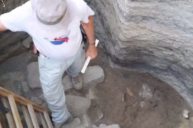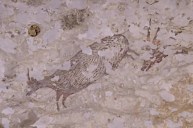An archeologist in France just got a blast from the past and possibly a dream come true. It is every archaeologist's dream to uncover incredible secrets from history, but to receive a letter is something else entirely. Well, it was this archeology team's lucky day. As they were amid a dig in northern France, they discovered a bottle with a 200-year-old message inside. It turns out that putting a message in a bottle actually works.
Message In A Bottle: What This 200-Year-Old Message Said

Screenshot from Facebook
As an archeology team and a group of volunteers were digging in northern France, they found a vial. The New York Post shares that the vial was found "with the letter still neatly rolled inside." It was "buried in a pot in an ancient Gaulish village" that the team and volunteers were exploring.
After opening the vial and removing the letter, the team discovered that this 200-year-old message was from a fellow archeologist. It was written and signed by archaeologist P.J. Féret. He "orchestrated a dig at the Cité de Limes site in January 1825."
How incredible is that? You are on a dig, hoping to uncover artifacts, and you find a note. A note from someone on the same site, doing the same thing 200 years ago. The New York Post shares the contents of the letter. The message in a bottle read:
" P.J. Féret, a native of Dieppe, member of various intellectual societies, carried out excavations here in January, 1825. He continues his investigations in this vast area. known as the Cité de Limes or Caesar's Camp."
What Does An Archeologist Do?

Pexels: Ron Lach
The leader of this dig shared that finding this 200-year-old message in a bottle was "an absolutely magical moment." While archaeologists expect to find some trace of human activity or history, he admits that finding a direct message or letter is rare.
He continues, "Most archaeologists prefer to think that there won't be anyone coming after them because they've done all the work!" What exactly is an archeologist's work? Also, what is it they are looking for? The Society For American Archaeology shares that "Archaeology is the study of the ancient and recent human past through material remains."
Archaeologists look for evidence of human presence in the past and use what they find to glean new information about their way of life and culture. Furthermore, when exploring a site, archaeologists search for all sorts of evidence of human activity, including written records, oral history, and artifacts.




